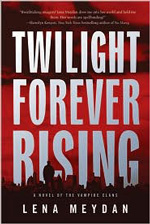

Tor Books, paperback, 9780765326799
Lena Meydan's novel Twilight Forever Rising (originally titled 'Blood Brothers' in Russian, perhaps changed in translation to capitalize on the Twilight phenomenon)—the first installment of a best-selling fantasy series in Russia—depicts a world in which humans unknowingly coexist with vampires who are the real forces behind politics, art, and war. The "blood brothers", as they are more commonly called, are divided into a number of clans, each possessing distinct skills or powers and espousing clashing ideologies about the proper relationship between humans and vampires. The clans view each other as distant branches of a single family but are not averse to conspiring against and killing each other to secure advantages for their own benefit.
The book focuses on a number of different characters, but devotes the most space to Darel, a telepath who serves as a kind of psychic detective for the leaders of his female-dominated clan. Unfortunately, Darel is a painfully uninteresting character whose motivations never extend beyond protecting the ordinary human girl with whom he has developed a relationship (who is equally tedious), and whose preachy moralizing quickly becomes tiresome. I found the antagonists and the minor characters more intriguing and complexly-drawn than the protagonists. The main "bad vampire" in particular is hilarious—a germaphobic fifth-century barbarian waif who seems more concerned about his carpets being trampled and the condition of his orchids than executing his evil master plan—but I admit to being completely clueless as to whether he is intentionally or inadvertently humorous.
This series superficially has much in common with a number of other "neutered vampire" tales in which the "good vampires" object to killing humans and the "bad vampires" are monsters who view humans as cattle. However, there are hints, mostly delivered by the bad vampires, that things are not as simple as we've been led to believe; this is a hopeful sign for those of us who like our evil creatures of the night to actually engage in evil. Mayden, in an interview posted on the publisher's blog, suggests that memory and its unreliability play a significant role in the series' narrative: "Time and history become distorted and we lose what was once the real picture. And with due diligence, any lie, after a few centuries, can become unshakable truth, especially when repeated to those who unconditionally believe you."
Despite some interesting ideas and great world-building, this book was painfully slow to develop. I was nearly halfway through this book before the central conflict was even hinted at, and the evil plot was explained after it had already failed, rather than while it was being carried out, which removed any hint of dramatic tension. Much of the book felt like the author's background notes, with poorly placed interjections of names, places, explanations, and sometimes I felt like I was reading the most annoying parts of a J. R. R. Tolkien fantasy novel. Whether it was the fault of Meydan or the result of poor translation, the prose was often clunky and confusing, and there was a curious inconsistency in the use of names and titles (unrelated to the use of Russian patronymics or diminutives), which often made it difficult to remember who was who.
I would recommend Twilight Forever Rising primarily to fans of contemporary vampire tales. Although the
pacing is slow and the prose is not especially distinguished, there are some interesting elements, and the
novel's unusual setting offers a new perspective. Readers who enjoy this first installment will be glad
to know that the second volume is currently being translated.
